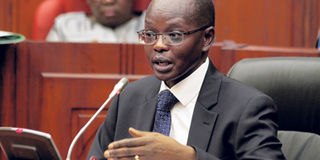Boinett: My plan to tackle security woes

President Uhuru Kenyatta's nominee for Inspector General of Police Joseph Boinett when he appeared before the joint security committee of Parliament and the Senate at the County Hall on February 26, 2015. PHOTO | DIANA NGILA |
What you need to know:
- The committee members sought to know how the nominee would use intelligence reports and his strategy to tackle corruption which has tainted the image of the police and undermined officers’ ability to deliver services to the public.
- Senator Ongoro said the committee should ascertain if the educational institutions that Mr Boinett went to were recognised by the Commission for University Education.
- He said that he was ready to revamp and re-energise the ongoing police reforms and turn around the National Police Service into one that offers people-centred policing.
Questions over the authenticity of Mr Joseph Boinett’s academic credentials and how he will tackle corruption in the police were key during Thursday’s vetting of the president’s nominee for police inspector-general.
Some members of the joint security committee of the Senate and National Assembly sought to know how Mr Boinett got two master’s degrees while working for the National Intelligence Service from where he was picked.
Mr Abdikadir Ore (Wajir North, ODM) and Elizabeth Ongoro (nominated, ODM) intimated that Mr Boinett might not have genuinely obtained the academic credentials.
“The attached transcripts are not clear and do not look genuine. What was your mode of study?” Mr Ore asked.
Senator Ongoro said the committee should ascertain if the educational institutions that Mr Boinett went to were recognised by the Commission for University Education.
The committee is co-chaired by Mr Asman Kamama (Tiaty, URP) and Senator Yusuf Haji (Garissa, TNA).
However, Mr Kamama and Mr Haji asked those questioning the nominee’s education background to spare their concerns for another forum.
“The committee will have an opportunity to cross check these details when we retreat to prepare the report that will be submitted in the two Houses. The authenticity of the academic papers will be checked,” Mr Kamama said.
The committee members are scheduled to meet on Sunday to discuss Mr Boinett’s suitability to head the country’s police service. This comes after Mr David Kimaiyo retired early at the height of protests over rising insecurity last year.
Mr Boinett told the committee that he earned his first degree online because he was working when he enrolled.
“Many universities worldwide have embraced the online mode of study including Kenyatta University, but I did my master’s as a full time student,” he said.
TACKLE CORRUPTION
The committee members sought to know how the nominee would use intelligence reports and his strategy to tackle corruption which has tainted the image of the police and undermined officers’ ability to deliver services to the public.
They observed that the police had been blamed for ignoring intelligence information that could have helped prevent crimes and demanded to know how Mr Boinett would improve working relations between the police and intelligence officers.
“If you are able to stamp out corruption, you will have done 90 per cent of your work,” Deputy Senate Speaker Kembi Gitura (Murang’a, TNA) said.
Mr Boinett told the committee that if given the job, he would firmly deal with corruption besides being the best placed to popularise the value of intelligence information given that he has worked in the National Intelligence Service as a principal intelligence officer.
Mr Boinett admitted that the relationship between the police and the intelligence service was marred by suspicion. He attributed this to lack of understanding of each other’s roles.
“Having worked both in the intelligence and police service, I clearly understand the distinct roles of both and if confirmed, I would be the best bridge,” he told the interviewers.
He said that he would not tolerate the blame game displayed by the two units.
“I know how intelligence is collected, analysed and delivered. If there would be any gaps, I would know where to ask,” he said.
He, however, declined to reveal some of his qualifications.
“Some of the trainings I underwent are classified and I wish they would remain the same,” he said.
To avoid deaths of police officers in the line of duty, he said that officers sent to risky regions, like cattle rustling prone counties, would be sufficiently equipped.
He also said that there should be no problem between Administration Police and their Kenya Police counterparts since the law clearly defines what each service should do.
NATIONAL SECURITY
Mr Boinett said corruption was a threat to national security and required a robust response to win public confidence.
“I am ready to slay the dragon of corruption whatever the consequences,” he said. “To deal with this monster called corruption, the most effective way is draining the swamp that permits corruption to thrive.”
This, he explained, entailed working with bodies like the Ethics and Anti-Corruption Commission and the Independent Policing Oversight Authority to seal loopholes that promote the vice and ensuring the process of punishing offenders is prompt, especially those involving traffic cases.
He said that he was ready to revamp and re-energise the ongoing police reforms and turn around the National Police Service into one that offers people-centred policing.
He also pledged to work within the confines of the law.
“I am kind and calm and ever reserved. That is the face you see. But, behind that, there is a very firm man. I don’t tolerate nonsense from anybody. I don’t accept mediocrity. I will confront entrenched cultures of impunity, corruption and abuse of human rights head on,” he said.



